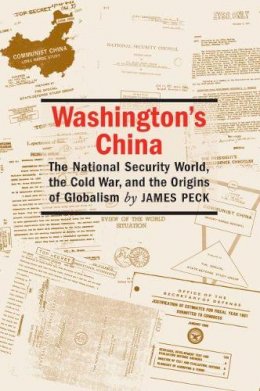
Stock image for illustration purposes only - book cover, edition or condition may vary.
Washington's China: The National Security World, the Cold War, and the Origins of Globalism (Culture, Politics, and the Cold War)
James Peck
€ 47.56
FREE Delivery in Ireland
Description for Washington's China: The National Security World, the Cold War, and the Origins of Globalism (Culture, Politics, and the Cold War)
Paperback. Addresses a central question about the Cold War: why did the US go to such lengths to isolate China from all diplomatic, cultural, and economic ties to other nations? Aiming to provide the answer, this book suggests that it was because of the fear of China's emergence as a power capable of challenging the new Asian order the US sought to shape. Series: Culture, Politics & the Cold War. Num Pages: 368 pages. BIC Classification: 1FPC; 1KBB; JPS. Category: (P) Professional & Vocational; (UP) Postgraduate, Research & Scholarly; (UU) Undergraduate. Dimension: 233 x 155 x 21. Weight in Grams: 494.
This book addresses a central question about the Cold War that has never been adequately resolved. Why did the United States go to such lengths, not merely to ""contain"" the People's Republic of China, but to isolate it from all diplomatic, cultural, and economic ties to other nations? Why, in other words, was American policy more hostile to China than to the Soviet Union, at least until President Nixon visited China in 1972? The answer, as set out here, lies in the fear of China's emergence as a power capable of challenging the new Asian order the United States sought to shape in the wake of World War II. To meet this threat, American policy-makers fashioned an ideology that was not simply or exclusively anticommunist, but one that aimed at creating an integrated, cooperative world capitalism under U.S. leadership - an ideology, in short, designed to outlive the Cold War. In building his argument, James Peck draws on a wide variety of little-known documents from the archives of the National Security Council and the CIA. He shows how American officials initially viewed China as a ""puppet"" of the Soviet Union, then as ""independent junior partner"" in a Sino-Soviet bloc, and finally as ""revolutionary model"" and sponsor of social upheaval in the Third World. Each of these constructs revealed more about U.S. perceptions and strategic priorities than about actual shifts in Chinese thought and conduct. All were based on the assumption that China posed a direct threat not just to specific U.S. interests and objectives abroad but to the larger vision of a new global order dominated by American economic and military power. Although the nature of ""Washington's China"" may have changed over the years, Peck contends that the ideology behind it remains unchanged, even today.
Product Details
Format
Paperback
Publication date
2006
Publisher
University of Massachusetts Press
Condition
New
Series
Culture, Politics & the Cold War
Number of Pages
368
Place of Publication
Massachusetts, United States
ISBN
9781558495371
SKU
V9781558495371
Shipping Time
Usually ships in 7 to 11 working days
Ref
99-1
About James Peck
JAMES PECK is director of the U.S.-China Book Publication Project and adjunct professor in East Asian Studies and history at New York University.
Reviews for Washington's China: The National Security World, the Cold War, and the Origins of Globalism (Culture, Politics, and the Cold War)
China is the subject matter of this book, but it is also the focus used by the author to analyze and dissect internal, highly classified American ideological explanations and justifications for its evolving strategies toward the entire 'communist bloc' throughout the Cold War.... Above all, Peck's study shows us the roots of American 'globalism' - its tendency to see the entire world as a single chessboard, much as the Marxist-Leninists did, rather than to deal discretely with different situations. - Chalmers Johnson, author of The Sorrows of Empire: Militarism, Secrecy, and the End of the Republic.
